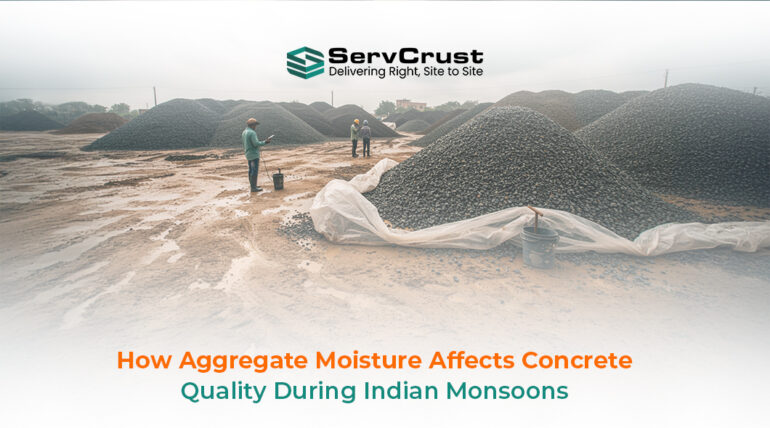
Aggregates form the backbone of any concrete mix. From homes to highways, they provide strength, structure, and durability. But there’s one invisible factor that can seriously affect the quality of aggregate moisture.
In India, where the weather changes between dry spells and heavy monsoons, moisture in aggregates becomes a hidden challenge. If it is too much moisture then your concrete gets weaker. And if it is too little, It won’t bind properly. Have you ever thought about how much water your aggregates are holding before mixing?
What Are Aggregates and Why Moisture Content Matters
The Role of Aggregates in Construction
Aggregates include materials like crushed stone, natural stone, sand, gravel, and others that form the bulk of concrete. In India, 10mm, 20mm, and 40mm stone aggregates are most commonly used.
They fill up 60%–75% of the volume of concrete. That’s why even small changes in their quality, especially moisture can impact strength and durability.
What is Moisture Content in Aggregates?
Moisture content refers to the amount of water retained in and around aggregate particles. It exists in two forms:
- Absorbed Moisture: Water held within the pores of the aggregate
- Free Surface Moisture: Water clinging to the surface
Why does this matter? Because moisture alters the water-cement ratio, the key to controlling concrete’s strength and workability. The aggregate water absorption ratio helps understand how much water an aggregate can absorb a critical detail during mix design.
Seasonal Impact: How Indian Weather Affects Moisture in Aggregates
The Monsoon Challenge
During the Indian monsoon, aggregates stored in open yards absorb large amounts of surface water. If not protected properly they become heavier and wet. Even when the sun comes out, the surface may look dry while the inner moisture remains high. Even experienced contractors face this issue if moisture levels aren’t adjusted.
This causes serious problems:
- Inaccurate batching
- Slump variations
- Inconsistent quality across pours
Impact on Concrete Quality
Excess moisture from aggregates makes the concrete too wet, unless adjustments are made. This can result in:
- Low strength
- Cracks after curing
- Delayed setting times
Using high moisture-resistant aggregates or drying them properly before use is essential during monsoon construction. Improper handling can compromise the integrity of the entire structure.
How to Measure Moisture in Aggregates Before Mixing
Simple Methods Used at Construction Sites
Field-level methods are commonly used by engineers and site managers:
- Oven Drying: Weigh before and after drying to calculate moisture
- Moisture Meters: Handheld devices that give quick readings
- Trial Batching: Small sample mixes to test required water levels
Each method helps decide how much water needs to be reduced from the mix. These methods don’t need expensive tools just awareness and consistency.
Lab Testing and IS Code Standards
For bulk orders or RMC plants, lab testing ensures reliability. According to IS:2386, moisture content should be measured and reported.
Moisture content testing kits and lab reports help procurement teams ensure materials meet quality standards. This also reduces concrete rejection and project delays.
Buying Aggregates Online? Moisture Shouldn’t Be a Guess
How to Choose a Reliable Supplier During Monsoon
Choose suppliers who provide lab-tested materials. Ask for their moisture control process. Check if their aggregates are covered or stored properly.
During the monsoon, always ask for moisture data. This builds trust and prevents mix failures.
Why Buy Aggregates Online During Rainy Season
ServCrust always offer transparency. Every batch is quality-checked, digitally tracked, and delivered with consistency.
With construction materials online, you can now choose high-quality, moisture-checked aggregates even during heavy rains.
Conclusion:
Moisture content in aggregates is often ignored, but it plays a crucial role in the quality of concrete. Especially in Indian weather conditions, where sudden rains and humidity can change everything.
Next time you order building materials online, make sure you ask about moisture testing. At ServCrust, we ensure that every batch is monsoon-ready, lab-tested, and delivered to your site on time.
Choose smart. Build safe.
